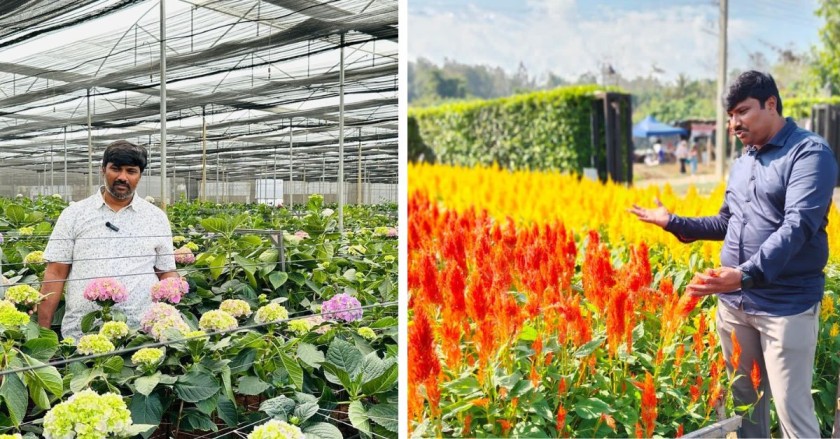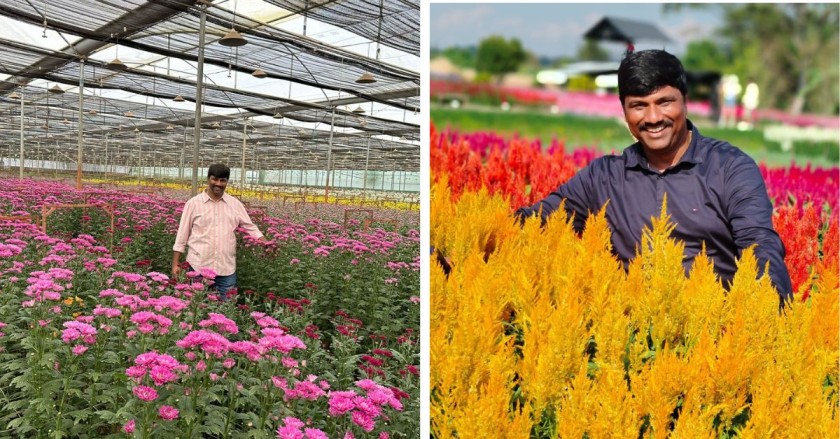Born in a traditional farming family in the Nizamabad district of Telangana, Srikanth Bollapally’s life was steeped in hardship from an early age. His family, like many others engaged in agriculture, struggled with poverty and mounting debt. Farming was the only profession he knew, yet it barely provided enough to survive.
As a young boy, Srikanth dreamed of completing his education and securing a stable future. However, those aspirations were cut short when his parents informed him they could no longer afford his schooling. Forced to abandon his education while still in Class 10, Srikanth had no choice but to step up and contribute to the family income. At just 16 years old, he left home and moved to Bengaluru in search of a livelihood.
The First Steps in Floriculture: Hard Work and Determination
Srikanth’s initial years in Bengaluru were anything but easy. He found work with a relative in the floriculture industry, earning a meager Rs 1,000 per month. While the pay was barely enough to make ends meet, he viewed the opportunity as a learning experience rather than just employment.

Over time, he absorbed every aspect of the trade, from cultivation and harvesting to marketing and even the export of flowers. He quickly realized that floriculture held immense potential, and with the right knowledge and business acumen, it could be a highly profitable venture. Driven by this realization, he decided to take a leap of faith and start something of his own.
The First Entrepreneurial Venture: A Small Flower Shop with Big Dreams
In 1997, with no financial backing and limited savings, Srikanth took his first step into entrepreneurship. Instead of cultivating flowers, he began sourcing them from local farmers and selling them through a small flower shop he set up in Bengaluru.
For over a decade, he diligently ran his shop, making reasonable profits. However, a desire for greater success pushed him to aim higher. He knew that while trading flowers was profitable, growing them himself would yield far better margins. More importantly, he wanted to control the entire supply chain—from cultivation to distribution.
Overcoming Financial Barriers to Establish His Own Farm
Starting a flower farm, however, was no easy feat. Floriculture requires significant investment, and the risks associated with it are much higher than traditional farming. Each acre required a substantial financial commitment, and Srikanth was faced with a major hurdle—securing funds to acquire land and develop the infrastructure for cultivation.
With some savings at his disposal, he turned to the government for assistance. Recognizing the support provided by the National Horticulture Board for floriculture ventures, he applied for loans and subsidies. His well-structured plan convinced the authorities, and he was granted financial aid.
Starting with just 10 acres of land, Srikanth worked tirelessly to build his flower farm. He reinvested his earnings, expanded his farmland, and continuously improved his cultivation techniques. Today, his farm spans an impressive 52 acres, producing 12 varieties of flowers, including roses, gerberas, carnations, and gypsophila.
The Rise of a Multi-Crore Floriculture Empire
From humble beginnings, Srikanth’s business has grown into one of the most successful floriculture enterprises in India. With customers spread across the country, including wholesalers, retailers, and wedding planners, his company clocks an annual turnover of Rs 70 crore. His personal earnings have skyrocketed to Rs 5 crore per year, a figure unimaginable during his early struggles.
Employing over 200 workers from rural Karnataka, Srikanth’s business is not only a financial success but also a source of livelihood for many. His farm operates on sustainable principles, utilizing organic cultivation methods and producing vermicompost from flower waste to fertilize the crops.
Challenges and Lessons from the Journey
Despite his remarkable success, Srikanth’s journey has been fraught with challenges. Climate unpredictability, market fluctuations, and gaining the trust of investors were major hurdles in his early years. Yet, his persistence and ability to adapt ensured his growth in the industry.
He firmly believes that agriculture, including floriculture, is a profitable venture if approached with the right knowledge and strategy. He encourages young people to reconsider their perception of farming, emphasizing that success in this field requires patience, hard work, and a willingness to embrace innovation.
A Message to Aspiring Farmers and Entrepreneurs
Srikanth’s story is a testament to the power of resilience, determination, and strategic thinking. Reflecting on his journey, he says, “There is a general trend in society, especially among the youth, to avoid farming due to the belief that it is unprofitable. However, if approached correctly, agriculture can be incredibly lucrative.”
For those looking to enter the floriculture industry, Srikanth offers a word of caution: “If you are in it for quick profits and government subsidies, this is not the right business for you. Growing flowers is an art that demands patience, attention, and a deep understanding of cultivation techniques. You need to be willing to put in the hard work, manage resources efficiently, and take calculated risks.”
Looking Back: The Unplanned Path to Success
From a teenage boy forced to quit school due to financial hardships to a multi-crore entrepreneur, Srikanth’s journey is nothing short of inspirational. He admits that his path was not planned—he simply took opportunities as they came, worked diligently, and adapted to the challenges thrown his way.
“I wanted to study further as a young man, but life had other plans for me. At one point, there was no roadmap; I was simply following the path in front of me and working hard. That is all I did,” he reflects.
Today, Srikanth Bollapally stands as a beacon of hope for aspiring entrepreneurs, proving that with perseverance and a vision, even the most challenging circumstances can be transformed into success.
